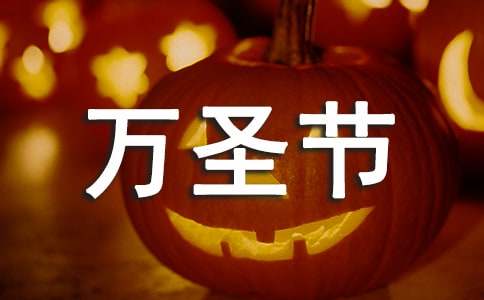萬圣節的英語介紹
在西方國家,每年的10月31日,有個“Halloween”,辭典解釋為“The eve of All Saints'Day”,中文譯作:“萬圣節之夜”。下面小編給大家準備了萬圣節的英語介紹,一起來看看吧!

【萬圣節的英語介紹】
Hallowe’en is a popular festival in many countries all over the world, and every year it seems to get bigger.
It’s getting dark earlier and it’s starting to get cold. Christmas is stilla long way away. We need something to cheer us up and take our minds of the fact that winter is nearly here. See how much you know about the traditional festival of Hallowe’en.
The origins of the name
The festival of Hallowe’en has its roots in Celtic and Roman traditions. Over 2,000 years ago the Celts in Britain, Ireland and parts of France celebrated Samhain to mark the beginning of winter. When the Romans invaded, they merged this with Feralia, their celebration of the passing of the dead. As Christianity spread, the Church tried to replace these pagan feasts with official Church holy days. One of these was November 1. It was called “All Hallows”, and October 31 was known as“All Hallows’ Eve”, and then Hallowe’en.
Hallowe’en traditions
In the past there was a tradition called “souling”. Poor people went around houses asking for food. In exchange, they promised to say prayers for the dead. People no longer go souling, but the habit has beentransformed into a modern Hallowe’en game for children in America,who dress up as ghosts, witches and monsters and go around people’shouses.
Witches
Hallowe’en wouldn’t be fun without witches. Witches have alwaysbeen part of popular folklore. Shakespeare’s play “Macbeth” opens withthree witches. A witchwas someone — usually a woman— who hadspecial powers and had dealings with the devil. The American town,Salem, is famous for the “witchcraft trials”, which took place there in1692.
Pumpkins
The pumpkin has become a symbol of Hallowe’en.People empty a pumpkin, cut a face into the side, and puta candle inside to make a lamp. It’s known as a Jack O’ Lantern, from a story about a man called Jack, who made a deal with the devil.
Animals
Black cats, frogs, mice and spiders are just some of the animals associated with Hallowe’en. Generally, the more unpleasant the animal,the stronger the Hallowe’en connection. Nocturnal animals like bats are particular favourites, and if, as is the case with vampire bats, they like drinking blood, they are highon the Hallowe’en list.
【萬圣節的南瓜車】
One story about Jack, an Irishman, who was not allowed into Heaven because he was stingy with his money. So he was sent to hell. But down there he played tricks on the Devil (Satan), so he was kicked out of Hell and made to walk the earth forever carrying a lantern。
關于萬圣節有這樣一個故事。是說有一個叫杰克的愛爾蘭人,因為他對錢特別的吝嗇,就不允許他進入天堂,而被打入地獄。但是在那里他老是捉弄魔鬼撒旦,所以被踢出地獄,罰他提著燈籠永遠在人世里行走。
Well, Irish children made Jack's lanterns on October 31st from a large potato or turnip, hollowed out with the sides having holes and lit by little candles inside. And Irish children would carry them as they went from house to house begging for food for the village Halloween festival that honored the Druid god Muck Olla. The Irish name for these lanterns was "Jack with the lantern" or "Jack of the lantern," abbreviated as " Jack-o'-lantern" and now spelled "jack-o-lantern."
在10月31日愛爾蘭的孩子們用土豆和蘿卜制作“杰克的燈籠”,他們把中間挖掉、表面上打洞并在里邊點上蠟燭。為村里慶祝督伊德神的萬圣節,孩子們提著這種燈籠挨家挨戶乞計食物。這種燈籠的愛爾蘭名字是“拿燈籠的杰克”或者“杰克的燈籠”,縮寫為Jack-o'-lantern ,現在拼寫為jack-o-lantern。
The traditional Halloween you can read about in most books was just children's fun night. Halloween celebrations would start in October in every elementary school. Children would make Halloween decorations, all kinds of orange-paper jack-o-lanterns. And from black paper you'd cut "scary" designs ---an evil witch with a pointed hat riding through the sky on a broomstick, maybe with black bats flying across the moon, and that meant bad luck. And of course black cats for more bad luck。
現在你在大多數書里讀到的萬圣節只是孩子們開心的夜晚。在小學校里,萬圣節是每年十月份開始慶祝的。 孩子們會制作萬圣節的裝飾品:各種各樣桔紅色的南瓜燈。你可以用黑色的紙做一個可怕的造形——一個騎在掃帚把上戴著尖尖帽子的女巫飛過天空,或者是黑蝙蝠飛過月亮。這些都代表惡運。當然黑貓代表運氣更差。
Sometimes a black cat would ride away into the sky on the back of the witch's broom. And on Halloween night we'd dress up in Mom or Dad's old shoes and clothes, put on a mask, and be ready to go outside. The little kids (children younger than we were) had to go with their mothers, but we older ones went together to neighbors' houses, ringing their doorbell and yelling, "Trick or treat!" meaning, "Give us a treat (something to eat) or we'll play a trick on you!"
有時候會出現黑貓騎在女巫掃帚后面飛向天空的造形。 在萬圣節的晚上,我們都穿著爸爸媽媽的舊衣服和舊鞋子,戴上面具,打算外出。比我們小的孩子必須和他們的母親一起出去,我們大一點的就一起哄到領居家,按他們的門鈴并大聲喊道:“惡作劇還是招待!”意思是給我們吃的,要不我們就捉弄你。
The people inside were supposed to come to the door and comment on our costumes. Oh! here's a ghost. Oh, there's a witch. Oh, here's an old lady. Sometimes they would play along with us and pretend to be scared by some ghost or witch. But they would always have some candy and maybe an apple to put in our "trick or treat bags." But what if no one come to the door, or if someone chased us away?
里邊的人們應該評價我們的化裝。 “噢!這是鬼,那是女巫,這是個老太婆。” 有時候他們會跟我們一起玩,假裝被鬼或者女巫嚇著了。但是他們通常會帶一些糖果或者蘋果放進我們的“惡作劇還是招待”的口袋里。可是要是沒人回答門鈴或者是有人把我們趕開該怎么辦呢?
Then we'd play a trick on them, usually taking a piece of soap and make marks on their windows. And afterwards we would go home and count who got the most candy. One popular teen-agers' Halloween trick was to unroll a roll of toilet paper and throw it high into a tree again and again until the tree was all wrapped in the white paper. The paper would often stay in the tree for weeks until a heavy snow or rain washed it off。
我們就捉弄他們,通常是拿一塊肥皂把他們的玻璃涂得亂七八糟。然后我們回家,數數誰的糖果最多。 還有一個典型的萬圣節花招是把一卷手紙拉開,不停地往樹上扔,直到樹全被白紙裹起。除非下大雪或大雨把紙沖掉,紙會一直呆在樹上。
No real harm done, but it made a big mess of both the tree and the yard under it. One kind of Halloween mischief。
這并不造成真正的傷害,只是把樹和院子搞亂,一種萬圣節的惡作劇。
【萬圣節的英語介紹】相關文章:
萬圣節介紹英語11-29
萬圣節英語介紹03-16
英語介紹萬圣節ppt03-16
萬圣節英語簡介01-10
萬圣節英語話劇03-17
萬圣節簡介英語05-24
萬圣節的英文介紹03-17
關于萬圣節的英語資料11-03
萬圣節英語單詞01-09